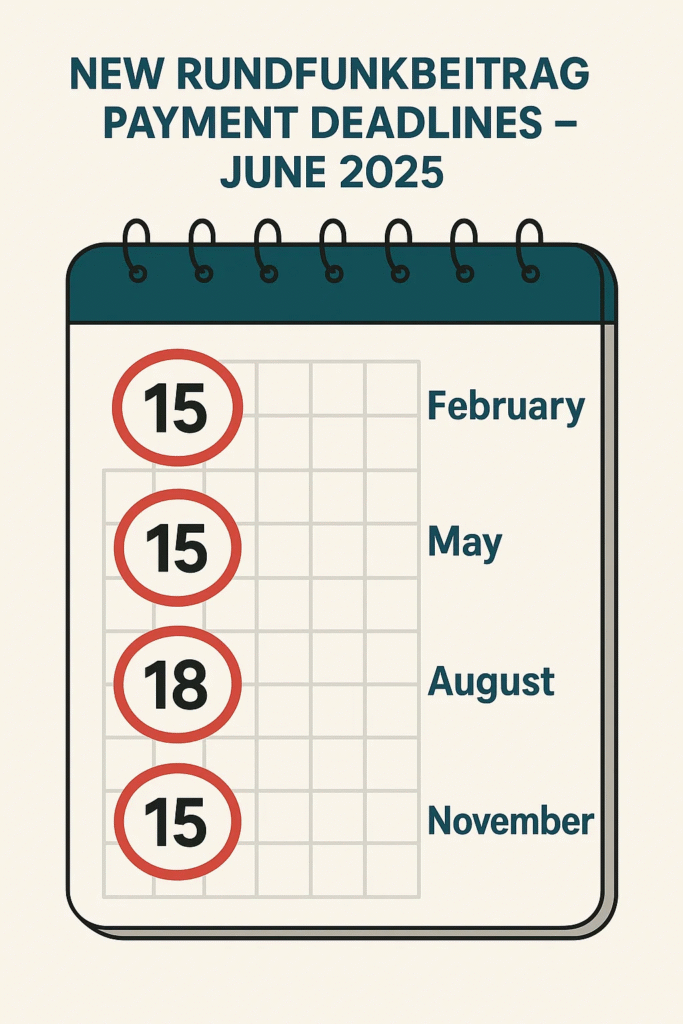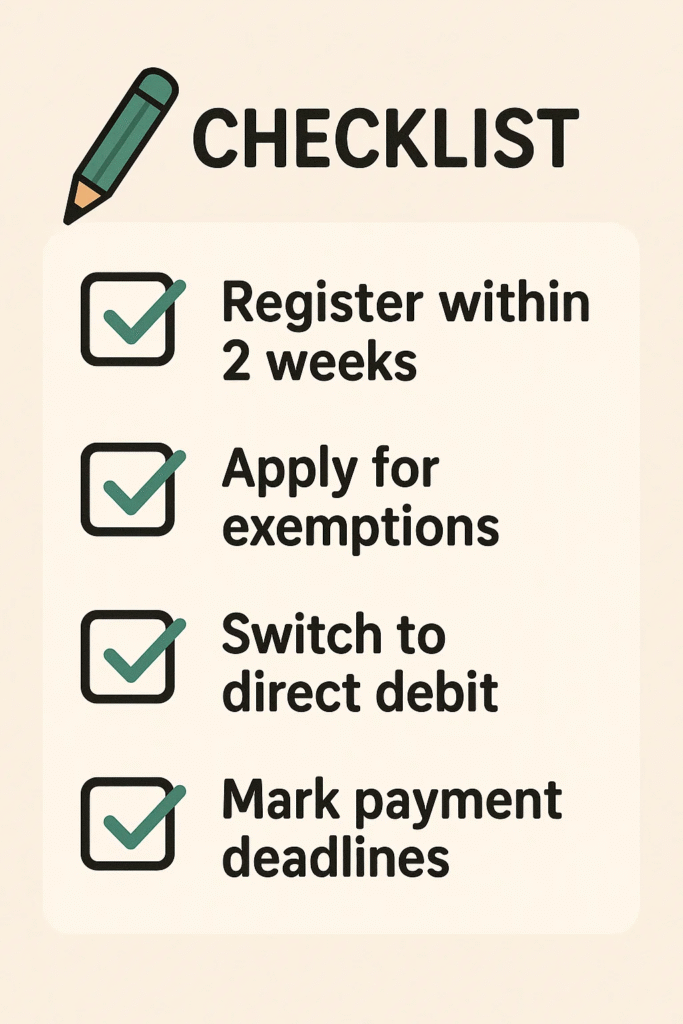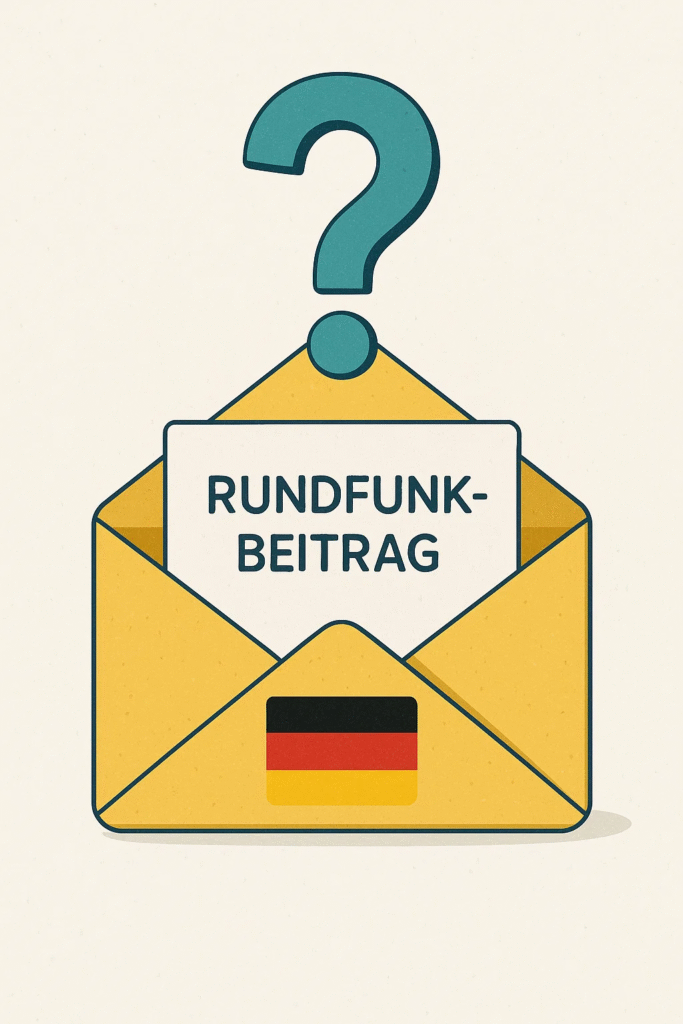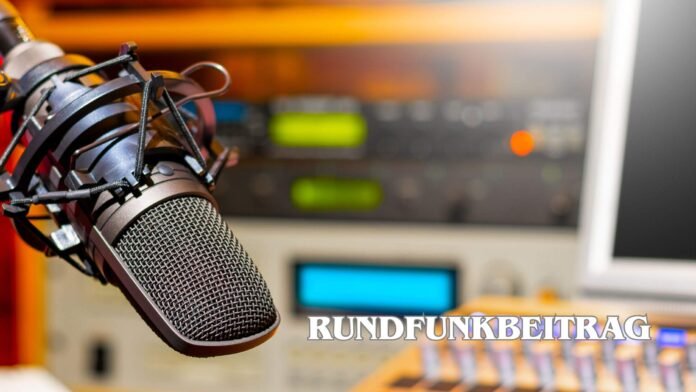
Introduction
As a newcomer to Germany, the first weeks often bring a flood of paperwork, residency forms, tax numbers, health insurance. Just as you settle into your new apartment, another letter lands in your mailbox: the Rundfunkbeitrag, Germany’s mandatory broadcasting fee. For many expats, this “radio tax” feels puzzling. You may not even own a TV, yet you’re asked to pay €18.36 every month. And now, with Germany broadcasting fee 2025 debates in full swing, the future of this charge is under the spotlight.
So, what exactly is this fee? The Rundfunkbeitrag funds Germany’s public broadcasters, ARD, ZDF, and Deutschlandradio. These institutions run everything from news to cultural programs and children’s shows. Every household must contribute, regardless of device ownership. That’s why even streaming-only users, or those who rarely consume German media, still receive the bill.
In 2025, several developments are worth watching. The good news: no increase in the €18.36 monthly fee this year. But there are changes in how payments are processed starting in June. At the same time, politicians and media leaders are deep in ARD ZDF fee reform talks. Some proposals could reshape programming, while others push for long-term restructuring of how the system is financed.
For expats, this isn’t just a political debate, it’s a legal obligation. Ignoring the letters can lead to back payments, collection notices, and even fines up to €1,000. This guide will simplify the rules, highlight key expats Rundfunkbeitrag changes, and prepare you for what’s ahead.
Let’s start with the basics to ensure you’re on solid ground.
What is the Rundfunkbeitrag? Understanding Germany’s Broadcasting Fee (300–400 words)
If you’re living in Germany, the Rundfunkbeitrag is one of those hidden rules that can surprise newcomers. Often called the “broadcasting fee” or “radio tax,” it’s not a voluntary subscription but a legal obligation. Understanding how it works will help you stay compliant and avoid unnecessary stress.
A Short History
The current model was introduced in 2013. Before then, fees were linked to owning a TV or radio under the old GEZ system. Now, it’s household-based: one flat rate per home, regardless of devices. The aim is to ensure stable funding for Germany’s public broadcasters, ARD, ZDF, and Deutschlandradio, which are independent of advertising pressure and government control.
Who Pays the Fee?
Every private household must contribute €18.36 per month. It doesn’t matter if you never switch on German TV. Businesses and institutions also pay, with fees scaled to size, for example, about €55.08 per quarter per employee.
There are exemptions, though:
- Students under 30 living in dorms
- People receiving social benefits (e.g., BAföG, unemployment benefits, welfare)
- Certain asylum seekers and residents with exceptional hardship cases
How It Works
The Beitragsservice, a central agency responsible for this purpose, collects the fee. When you register your address (Anmeldung) at the local Bürgeramt, your details are automatically shared, and within a few weeks, you’ll receive a letter asking you to sign up. You should register within 2 weeks of moving in.
Payment options include:
- Monthly direct debit (most convenient)
- Quarterly
- Semi-annual
- Annual
Here’s a quick overview:
| Household Type | Monthly Fee | Notes |
|---|---|---|
| Private household | €18.36 | Covers all residents in one home |
| Student dorm resident | €0 | Exempt if under 30 |
| Business (per employee) | €55.08/quarter | Scaled based on workforce size |
The Scale of the Rundfunkbeitrag: Key Statistics for 2025

- About 42 million households contribute across Germany.
- Annual revenue is approximately €9.2 billion, accounting for roughly 90% of public broadcasting budgets.
- Among Germany’s 1.5+ million foreign residents, many are caught off guard, and over 100,000 exemption applications are filed each year.
For expats, the rules may seem strict, but they’re clear once you know them. Paying the fee is simply part of living in Germany, much like registering your address or getting health insurance.
Why This Matters for Expats: Navigating Rundfunkbeitrag Changes as a Newcomer
If you’re new to Germany, chances are the Rundfunkbeitrag letter will land in your mailbox within weeks of moving in. It’s written in German, full of official language, and easy to mistake for spam. Many expats assume it only applies to people with TVs or radios. That’s a common misunderstanding, and one that can cost you.
Common Confusions
- The fee is not optional. Every household pays, even if you only stream or never watch local media.
- Official letters are only in German, which can delay responses.
- In shared flats, only one person registers, but all roommates are jointly responsible.
2025 Relevance
This year brings no fee hike, but reforms to ARD ZDF funding are under discussion. With changes ahead, it’s smart to get your status clear now, especially if you’re a short-term resident who may qualify for an exemption.
Pitfalls to Avoid
- Late fees start at €8 for missed payments.
- Persistent non-payment can mean fines up to €1,000.
- Ignoring letters doesn’t make them go away; it only adds stress and debt.
Here’s a quick personal story many expats can relate to: “Like many newcomers, I ignored the first Rundfunkbeitrag letter, thinking it didn’t apply. Months later, I got a bill for back payments plus a late fee. Don’t make that mistake, sort it early.”
Expats and the Fee: How Many Are Affected?
- Germany is home to 13 million immigrants, and about 3 million are working professionals (expats).
- Surveys show 40% of expat households report confusion in their first year.
- The Beitragsservice receives over 50,000 queries annually related to expat cases.
How to Handle It
- Register online bei rundfunkbeitrag.de.
- Apply for exemptions if eligible (students, benefit recipients) by submitting proof.
- Keep copies of all forms for your records.
You’re not alone in this; expats’ Rundfunkbeitrag changes are a shared headache. But once you know the steps, it’s easy to stay compliant and avoid fines.
The June 2025 Update: How Payment Processes Are Changing
If you’re paying the German broadcasting fee 2025 by bank transfer, big changes are coming this summer. Starting June 2025, households will no longer receive monthly invoices. Instead, the Beitragsservice will send one annual letter listing your deadlines for the year.
What’s Changing?
- Until now: You received monthly or quarterly payment slips.
- From June 2025, you will receive a single letter each year with four payment dates. These fall on the 15th of February, May, August, and November, depending on your move-in date.
- Goal: Reduce paperwork and cut administrative costs across Germany’s 42 million households.

Who Does It Affect?
- Bank transfer payers → Yes, this is you if you log into your bank each month to pay. Many expats start this way.
- Direct debit users → No change. If you’ve already set up auto-pay, you’re good to go.
Why It Matters
This system should be simpler long-term, but it does mean more responsibility upfront. Missing a deadline triggers a 1% late fee (minimum €8).
Here’s what you can do:
- Check your move-in date. That decides your schedule.
- Example: If you moved in January, your first payment is due February 15.
- Mark your calendar. Add reminders in your phone now.
- Consider switching to direct debit. Fill out the free online form at rundfunkbeitrag.de to automate payments and avoid mistakes.
A simple calendar graphic could help here: circle the February, May, August, and November dates so they stand out.
This update won’t raise your fee, but it does change how you pay. Taking five minutes to set reminders today can save you late fees tomorrow.
The Bigger Picture: ARD ZDF Fee Reform and the 2025 Debate
While the Germany broadcasting fee 2025 itself isn’t rising, the wider debate is heating up. Germany’s public broadcasters, ARD, ZDF, and Deutschlandradio—are under pressure to modernize, cut costs, and prove their relevance in the age of Netflix, YouTube, and Spotify. For expats, this could mean changes in the channels and content you actually see.
Background: How We Got Here
The fee system is reviewed every four years by the KEF (Commission for the Determination of the Financial Needs of Broadcasters). In 2024, KEF proposed raising the monthly fee to €18.94 (an increase of 58 cents) to keep pace with inflation. But in October 2024, Germany’s state premiers, who must unanimously approve any change, opted to freeze the fee at €18.36 for 2025. Their message was clear: efficiency first, money later.
Proposed Reforms for Summer 2025
To match the freeze, broadcasters themselves have put forward a reform package, which could roll out in mid-2025 if approved:
- Cutting up to 20 radio programs across regional networks
- Halving the number of TV channels (debates include closing Arte, Phoenix, or KiKA)
- Reducing costly sports broadcasting rights
- Scaling back on duplicate regional content
The idea is to save around €100–200 million per year while keeping core services intact.
Political Context
Public broadcasting has constitutional protection in Germany. Broadcasters argue that underfunding undermines independence, and they’ve already launched a constitutional challenge against the fee freeze. Meanwhile, the October 2024 premiers’ conference showed just how hard it is to get 16 federal states to agree. Any long-term ARD ZDF fee reform will likely link funding to inflation, reducing the political battles each cycle.
The Financial Stakes in ARD ZDF Fee Reform

- Annual ARD/ZDF budget: €8+ billion, with about 70% funded by fees
- Reforms aim to save €100–200 million annually
- Public opinion: 55% of Germans back reform, citing inefficiency (ARD survey, 2024)
- Expats: 60% unaware of how public broadcasting is funded (expat forum polls)
What It Means for Viewers
The debate cuts both ways. On one hand, reforms could streamline services and force broadcasters to focus on quality. On the other hand, cuts risk losing cultural programming, niche channels, and sports coverage that many people enjoy. For expats, this might mean fewer opportunities to watch German-language programs that help with integration.
The key takeaway: while the fee stays the same in 2025, the way your money is used could change dramatically. Staying informed will help you understand what to expect and how it may affect the content available in your living room.
What Expats Should Do Next: Practical Advice for 2025
By now, the Rundfunkbeitrag should feel less intimidating. The rules are clear, and the 2025 updates give you a chance to get organized. Here’s how to stay compliant and avoid wasting money.
Stay Updated
- Bookmark rundfunkbeitrag.de for official news.
- Follow reliable expat sites for English-language updates on expats’ changes to the Rundfunkbeitrag.
Take Action Now
- Register promptly if you’ve just moved. Don’t wait for reminder letters.
- Apply for exemptions if eligible (students, low-income, certain asylum seekers). Download the form online and send it with proof.
- Switch to direct debit before June 2025 to avoid missing deadlines under the new system.
Plan for Scenarios
- If reforms move forward, the fee stays at €18.36, but you may notice fewer channels or sports events.
- If you prefer international shows or language learning, consider pairing your fee with a private streaming service.
Quick Checklist
- Register within 2 weeks of moving in
- Mark June 2025 in your calendar for payment process changes
- Download the exemption form today (if applicable)
- Set up direct debit for peace of mind

Taking these steps now protects your wallet and saves you from late fees later. The broadcasting fee is part of life in Germany, but it doesn’t have to be stressful. A little preparation ensures you can focus on enjoying your new home, not battling bureaucracy.
Conclusion
The German broadcasting fee for 2025 may not be going up, but it’s still central to life here. At €18.36 per month, every household contributes, whether you watch German TV or not. For expats, the key updates to watch are the June payment process change and the ongoing ARD ZDF fee reform debates that could reshape programming.
Understanding the expats’ Rundfunkbeitrag changes now means fewer surprises later. Registering on time, applying for exemptions if you qualify, and setting up direct debit can save you late fees and stress. And while reforms may cut channels or shift focus, the core idea remains: funding independent media that serves the public.
Whether you’re a newcomer still unpacking boxes or a long-term resident curious about reforms, staying informed helps you protect your wallet and navigate German bureaucracy with confidence.
Share your own experiences with the Rundfunkbeitrag in the comments, did you find it confusing at first?
Subscribe to our expat guide series for more practical tips, or check out our payment calculator to plan ahead.
Germany’s system may feel complicated at first, but once you learn the rules, it’s surprisingly fair. With a little preparation, you can welcome these changes and focus on enjoying your life here.
FAQs: Germany Broadcasting Fee 2025

1. Do I have to pay the Rundfunkbeitrag if I don’t own a TV or radio?
Yes. Since 2013, the fee has been household-based, not device-based. Every home pays €18.36 per month, regardless of media use.
2. I just moved to Germany. When do I need to register for the fee?
You must register within 2 weeks of your official address registration (Anmeldung). Expect a letter from the Beitragsservice shortly after.
3. What happens if I ignore the letters?
Ignoring them can lead to back payments, late fees starting at €8, and fines up to €1,000. It’s better to register quickly or apply for an exemption if eligible.
4. Who can apply for an exemption?
- Students under 30 in dormitories
- People receiving social benefits (e.g., BAföG, unemployment assistance)
- Certain asylum seekers or hardship cases
5. What’s changing in June 2025?
Households paying by bank transfer will no longer get monthly invoices. Instead, they’ll receive one annual letter with four payment deadlines (Feb, May, Aug, Nov). Direct debit users are not affected.
6. Will the fee increase in 2025?
No. Despite recommendations to raise it slightly, state premiers froze the fee at €18.36. However, discussions on ARD ZDF fee reform could reshape programming.
7. Can expats get out of paying if they’re only here short-term?
No, unless you qualify for an exemption. Even short-term residents are required to pay as long as they register an address in Germany.
8. How many people actually pay the fee?
About 42 million households contribute, raising around €9.2 billion annually. Among expats, confusion is common, with more than 50,000 queries filed each year.

